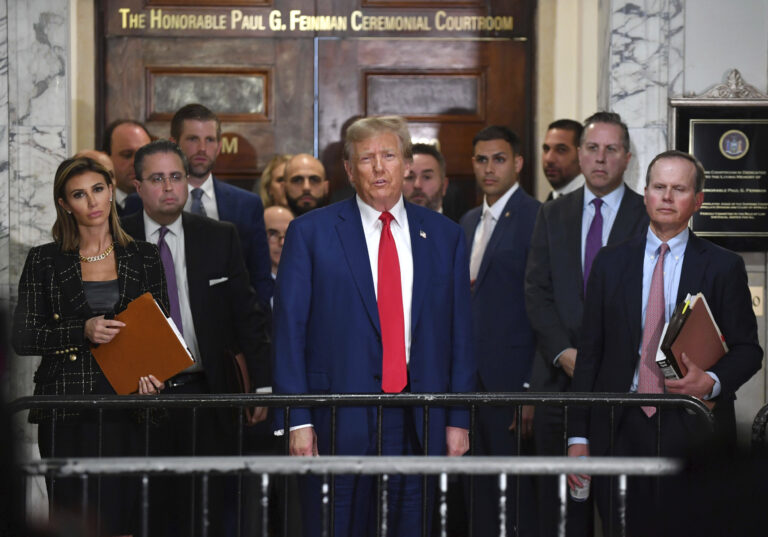An appeals court has overturned the massive civil fraud penalty against President Donald Trump, ruling Thursday in New York’s lawsuit accusing him of inflating his wealth.
The decision, which narrowly upheld a finding he engaged in fraud by exaggerating his wealth for decades, still bans him and his two eldest sons from serving in corporate leadership for a few years.
It came seven months after the Republican returned to the White House. A five-judge panel of New York’s Appellate Division concluded that the $515 million judgment—originally set at $355 million plus interest—was “excessive” and unconstitutional under the Eighth Amendment. Trump had managed to stave off immediate collection by posting a $175 million bond earlier this year. That sum will now be repaid to the Trump Organization.
Eric Trump, the president’s son, posted on X, “Total victory in the sham NY Attorney General case!!! After 5 years of hell, justice prevailed!”
The appeals court, divided on the case’s merits and the trial judge’s fraud finding, threw out Judge Arthur Engoron’s penalty in full but left the door open for further appeals to New York’s highest court, the Court of Appeals.
New York Attorney General Letitia James said Thursday that her office plans to appeal the ruling.

Associated Press
What to Know About the Civil Fraud Case Against Donald Trump
New York Attorney General Letitia James filed a sweeping civil fraud lawsuit in 2022 against Donald Trump, the Trump Organization, and his adult sons, Donald Trump Jr. and Eric Trump, alleging they inflated property values to secure favorable loans and insurance terms. The case unfolded alongside Manhattan District Attorney Alvin Bragg’s separate prosecution of Trump on criminal charges, underscoring the breadth of legal challenges the former president faced in New York.
The civil trial began in October 2023 and concluded in January 2024, with Judge Arthur Engoron ruling that Trump, Eric Trump, and Donald Trump Jr. engaged in persistent financial deception. He ordered Trump to pay $355 million, a penalty that—with interest—surged past $515 million.
Engoron’s ruling also carried sweeping business restrictions: Donald Trump was barred from running any New York company for three years, while Eric and Donald Jr. faced two-year bans from serving as corporate officers. The court required continued oversight of the Trump Organization through an independent compliance director and a court-appointed monitor, further constraining the family business. As Bragg pressed forward with his criminal hush money case in parallel, Trump denounced both efforts as politically motivated “witch hunts.”
New York Appellate Division Ruling
The appeals panel struck down the financial penalty entirely but left open the possibility of further appeals to New York’s highest court. Other sanctions Engoron imposed—such as temporarily barring Trump and his sons from corporate leadership roles—remain on hold while appeals continue.
The appeals court, divided on the case’s merits and the trial judge’s fraud finding, threw out Engoron’s penalty in full but left the door open for further appeals to New York’s highest court, the Court of Appeals.
In a sharply worded opinion, which totaled more than 300 pages, Judges Dianne T. Renwick and Peter H. Moulton wrote that while Engoron’s restrictions on Trump’s business practices were “well crafted,” the staggering monetary punishment crossed a constitutional line. “The court’s disgorgement order, which directs that defendants pay nearly half a billion dollars to the State of New York, is an excessive fine that violates the Eighth Amendment of the United States Constitution,” they noted.
The panel’s deliberation took nearly 11 months after oral arguments last fall—an unusually long time compared to the typical turnaround of weeks or a few months. That delay reflects the high stakes and complex constitutional questions surrounding the case, which has been viewed as a test of how far state officials can go in penalizing corporate misconduct.
The ruling is the latest turn in Trump’s ongoing legal battles, which include his criminal hush money case, a pair of civil defamation verdicts tied to writer E. Jean Carroll, and other litigation. Despite these hurdles, Trump has pressed ahead with his second term in office.
What is Donald Trump’s Net Worth?
Donald Trump’s net worth has long been a subject of scrutiny and debate, especially as his wealth has played a central role in both his business career and political identity. Estimates vary depending on the source and methodology.
Just three months into 2025, President Trump’s net worth has dropped by $1.5 billion, according to Forbes estimates. According to Forbes, Trump’s net worth decreased from roughly $6 billion to $4.5 billion from January 1 to March 11, 2025.
Part of the reason Trump’s net worth has been declining in recent years is that real estate, where the president made most of his money, has struggled amid high interest rates in the United States.
Trump himself has often claimed a much higher figure, citing the intangible value of his brand as justification for estimates exceeding $10 billion.
His financial picture has been complicated by ongoing legal battles, fluctuating property values, and mounting penalties from civil and criminal cases. While the appeals court ruling tossed his civil fraud penalty in New York, Trump still faces other costly judgments and legal fees. Nonetheless, his core assets—including marquee properties like Trump Tower and Mar-a-Lago—continue to anchor his wealth, even as the exact number remains difficult to pin down.
Update: 8/21/25, 11:19 a.m. ET: This article was updated with new information and remarks.
Update: 8/21/25, 11:28 a.m. ET: This article was updated with new information and remarks.
Update: 8/21/25, 11:58 a.m. ET: This article was updated with new information and remarks.
Update: 8/21/25, 12:17 p.m. ET: This headline was updated for clarity.
Update: 8/21/25, 1:41 p.m. ET: This article was updated with new information and remarks.
This article includes reporting by the Associated Press.


